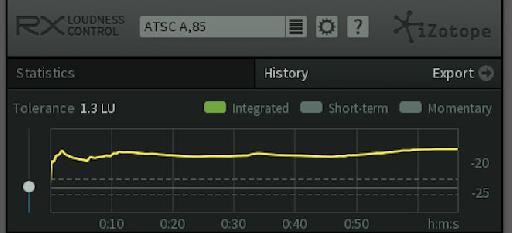Music and audio for video is becoming a staple of the modern project studio. In the past, only specialized, larger studios had the gear required for synchronization to picture. These days, however, even the smallest project studio can provide a soundtrack for just about any video project, no matter how complex. Delivering your work in a format that global broadcasters expect, however, can be a challenge. That's where RX Loudness Control comes in.
Meeting the Standard
RX Loudness Control is designed to meet almost any standard for broadcast audio you can imagine. Global standards, US standards, European standards, Australian standards… RX has them all. For those of you unfamiliar with the process, getting your mix to pass loudness compliance can be a 'make it or break it' process. If you do an audio mix for TV or film that will be broadcast in any major market, you can count on someone testing your mix to see if it is within compliance (and you can also count on having to re-do your mix when it gets sent back to you after failing the compliance test).
It's Not Just Peaks
Different loudness standards have different requirements for peaks, RMS, momentary, and LRA values of your mix. It's not just how loud it is... it's how loud it is for what length of time. It's also the difference between the softest point and the loudest point of your mix. All of these things can get pretty complicated, and after a week or so with RXLC I can confidently say that iZotope has met their goal of making the end user able to navigate these waters with ease.
What The Heck Is It Doing, Anyway?
First, RXLC can analyze your audio without touching it. You can generate a CSV file that is openable in excel or a similar program. This allows you to see exactly where your problem spots are, and if you want to fix them manually, although after using RXLC a bit I can honestly say you don't need to, you can.
Second, RXLC will compute how much correction is required to hit the target while still maintaining your complete dynamic range, (distance between the softest and loudest point in your mix). So basically RXLC will gain up your mix to meet the standard, engage an RMS compressor only when necessary to limit the short term (momentary) loudness, and utilize a peak limiter to stop any drastic problems.
Does It Squash?
After using it on a few mixes I was happy to see that in general, I was already ok, although it is important to note that even one tiny violation of a loudness stand would likely have my mix rejected and sent back. Did some of my mixes go down in volume? Absolutely. I did not, however, feel like I lost the dynamic range. I decided to really try to push RXLC so that I could hear the results. I started cranking up a rock mix until the limiter portion of RXLC had to kick in quite a bit. I definitely heard the effects then, but that's a good thing. I mean, this tool is supposed to keep me in compliance, and keep me in compliance it did.
Generally, if your mix is pretty good, the tweaks that RXLC needs to make to it will not make your audio 'feel' more compressed. After running quite a few mixes through RXLC it became pretty evident that I could feel safe that it was doing what it needs to do, and no more. If it had to make major audible changes, the mix was already pretty bad and should have been re-thought anyway.
Conclusion
RX Loudness Control is a fairly straightforward tool that can save you a lot of time if it's a tool that you need. If you already manually deliver to one of the various broadcast standards, then you can be assured RXLC will cut out a major step in your workflow without degrading the quality of your mix. My only gripe is that it's only available for Pro Tools and Adobe CC. AU plugin users and Final Cut Pro users can't use the plugin without a copy of Pro Tools or the Adobe suite.
Price: $349 Pros: Delivers loudness compliance information without altering the audio, can make your mix compliant by altering only the few points it needs to, simple to use interface. Cons: Pro Tools and Adobe CC plugin format only. Web: https://www.izotope.com/en/products/post-production/rx-loudness-control/ |



 © 2024 Ask.Audio
A NonLinear Educating Company
© 2024 Ask.Audio
A NonLinear Educating Company
Discussion
Want to join the discussion?
Create an account or login to get started!